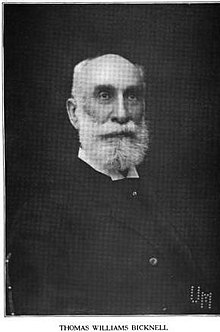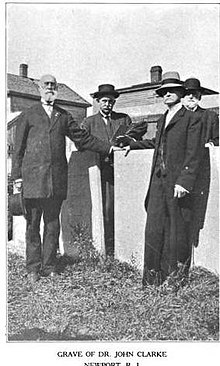Thomas W. Bicknell

Thomas W. Bicknell (September 6, 1834 – 1925), American educator, historian, and author, lived to be 91.
Early life and career
Thomas Bicknell was born in Barrington, Rhode Island, the son of a farmer, minister, state legislator, and Colonel in the Bristol County, Rhode Island Militia. Thomas Bicknell attended Thetford Academy in Vermont and Amherst College in Massachusetts, taught school and became principal in Rehoboth, Massachusetts, then principal in Elgin, Illinois.
When he returned to Rehoboth, serving as principal once again, he earned a master's degree from Brown University. While a senior at Brown he was elected State Representative in the Rhode Island General Assembly. After graduating from Brown, he became principal of Bristol High School and then Arnold Street Grammar School, then back to Bristol High School.

Rhode Island Governor Seth Padelford (Republican 1869–1873) selected Bicknell to be the Commissioner of Public Schools in 1869. As commissioner he focused on re-establishing the Normal School (now Rhode Island College). He was a gifted speaker and fundraiser, who would triple the amount of money spent on public education; he also established a Rhode Island State Board of Education, oversaw the selection of school superintendents in every town and city in the state, dedicated over 50 new schoolhouses, and increased the school year from 27 to 35 weeks.
Civil rights reformer
In the 1850s Bicknell signed on to help settle the State of "Free Kansas" to prevent the spread of slavery. On the way to Kansas he was taken hostage by bandits on the Missouri River, but after two weeks as a prisoner, sharpshooters set him adrift.
Bicknell was an equaligist, a racial and sexual reformer, an early advocate to end Black segregation in schools; he also helped elect the United States' first all-female school board for the town of Tiverton, Rhode Island.
Heritage and legacy
Bicknell was the founder of the National Society of the Sons and Daughters of the Pilgrims and Order of the Founders and Patriots of America (1898). He re-established, and was the president of, the American Institute of Instruction, and was president of the Rhode Island Institute of Instruction and the National Educational Association. He was the president of the New England Publishing Company.
In 1914, wanting to have a town named for him, he offered a 1000-volume library to any town in Utah that would adopt his name. Two towns vied for the prize, Grayson and Thurber; the two towns compromised and in 1916 Thurber changed its name to Bicknell, and Grayson took the name of Blanding, the maiden name of Bicknell's wife. The towns then split the library with 500 books to each.[1]
Bicknell and his wife, Amelia, donated $500 US$ to the Rehoboth Antiquarian Society in Rehoboth, to establish the Blanding Public Library in memory of Amelia's parents, Christopher and Chloe Blanding.
In addition to education, he was also active in civic activities and the church. He served as commissioner from Rhode Island to the Universal Exposition at Vienna, Austria. He helped establish the U.S. Postal Code system as a member of the 1878 Postal Congress. He served as president in over thirty associations and organizations, and was a member in over one hundred. He was president of the International Sunday School Union, the Massachusetts Congregational Sunday School Union, the Chautauqua Teachers' Reading Union, and the New England Sunday School Association.
Writings
Bicknell was an author, editor, and publisher of the New England Journal of Education (Boston, 1875–1880). He was the author of the five-volume History of Rhode Island and Providence Plantations,[2] the author-publisher of The Governors of Rhode Island, The Dorr War, The Story of the Rhode Island Normal School,[3] and Story of Dr. John Clarke,[4] and the editor-publisher of History and Genealogy of the Bicknell Family and Collateral Lines.[5] As a historian he also contributed to The Bay State Monthly magazine.[6]
References
- ^ Van Cott, John W. (1990). Utah Place Names. Salt Lake City, Utah: University of Utah Press. p. 31. ISBN 0-87480-345-4.
- ^ Bicknell, Thomas W. (1920). History of Rhode Island and Providence Plantations. The American Historical Society.
- ^ Bicknell, Thomas W. (1911). The Story of Rhode Island Normal School.
- ^ Bicknell, Thomas W. (1915). Story of Dr. John Clarke.
- ^ Bicknell, Thomas W., ed. (1913). History and Genealogy of the Bicknell Family and Collateral Lines.
- ^ "The Bay State Monthly – Volume 1 (Contents)". Books Should Be Free. Retrieved April 28, 2013.
